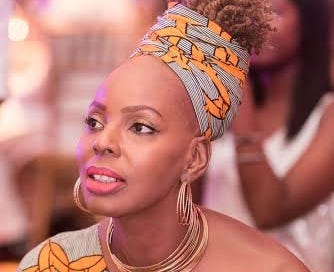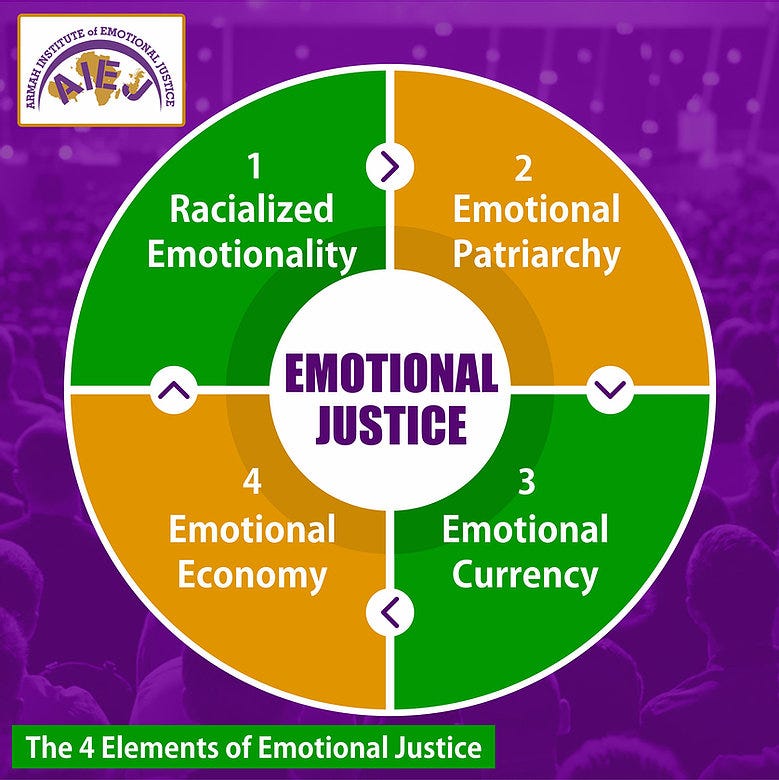'No dismantling without intimate reckoning'
5 questions for facilitator, playwright, and visionary Esther Armah
Esther Armah reached out to me on twitter late last year. Though we both have an ambient sense that we met at a conference in the before times, we can’t quite place it. In any case, we’ve been circling one another, appreciating one another’s writing, sensing there was something mutual and ripe for exploration. When we hopped on Zoom late last year our hunch was confirmed. We’ve decided to do monthly conversations with no agenda other than to build our relationship, learn from one another etc. It’s a joy to “gain” a person in this time of so much loss. And as you’ll see, this journalist/playwright/radio host/truthteller/healer is the kind that rearranges your whole perception of reality within an hour of exploration. I have already been changed by her and I know we’re just getting started. Meet Esther Armah, Executive Director, The Armah Institute of Emotional Justice…
Courtney Martin: Many of us experienced 2020 as a year of racial reckoning. There was a bit of a rush to accountability, some of which ended up being substantive, some of which ended up being pretty performative. What do you wish those just waking up to racial injustice within their institutions and their lives, largely White folks, understood about how to approach learning, changing, growing in this moment?
Esther Armah: The difference between a moment that is transformative vs. one that is traumatizing. This is about centering. What for them was transformative, was simultaneously traumatizing for millions of Black people. These two responses to a similar set of events are crucial as a learning entry point on racial injustice. What is a lesson for you, has been a living, an ongoing reality for millions of Black folk - a daily cloak that wraps around their bodies, lives, and those they love.
Be passionate about your awakening, do not presume that Black people should share your passion at your realization. That is a recipe for the kind of conflict that degenerates rapidly. What those who are waking up to racial injustice must understand is that your emotionality—feelings of guilt and shame—if they are not put in service to the crucial work of dismantling inequitable systems, do nothing but paralyze possibility. Your work is with each other as White people.
In my framework Emotional Justice, we call it 'an intimate reckoning.' That means it is your relationships that require a particular excavation, exploration, and confrontation. Your relationship to power and how it is wrapped in whiteness, your sense of self in connection to White men, and Black people, that requires scrutiny.
For White women, it means holding your sisters accountable in ways you have rarely done. And it means confronting relationships with the White men in your lives that you love, lean on, live with, laugh with, in unprecedented ways.
Loss. That is what you face. Loss of sisterhood, loss of a particular love with and by the men in your life. What you gain is a humanity, an anti-racist practice and a more equitable work. The real mistake is to believe you access any of this without sacrifice, serious challenge, trauma…and it may not feel transformative at all. This is what fighting for justice, a more just world will be for some of you. The reward will be for us, the challenge is doing the work, and evading performance.
Unfortunately it often feels like we are still attacking racism or sexism or classism in silos. You talk about "emotional patriarchy," which I think goes a long way in pulling us out of the silos. Can you explain what that is and how you see it showing up most often?
Emotional Patriarchy (EP) is one of the four pillars of Emotional Justice, a visioinary framework for racial healing.
EP is when systems and society, center, privilege and prioritize the feelings—the pain, sadness, anger, fear, threat, vulnerability—of of White men no matter the cost or consequence to society, to women, to Black and Brown peoples. This is not feelings in an individual, traditional isolated sense. It’s emotion as collective, as structural, as a crucial part of what upholds White supremacy. We have all been nurtured to cater to an Emotional Patriarchy. It surrounds and envelops us. Nobody lives, moves, loves, works in silos. We do so in our specific bodies, that are White, Black, that are gendered and raced, that must navigate a world whose foundation is inequity, anti-Blackness, sexism, and a White supremacy. That we are complex and complicit. Emotional patriarchy invites us to reckon with that nuance in ways we resist. It is about White men whose understanding of themselves, whose relationship to power is rooted in subjugation and exploitation. The one way they feel powerful, and hold power is in comparison to what and who they control. For them power without control of other bodies, futures and possibilities triggers trauma, feelings of loss, weakness and a loss of sense of self. That culminates in violence. We see that again and again. It requires dismantling.
There is no dismantling without intimate reckoning.
And that intimate reckoning with White men must come from White women in ways that has never happened, but must if sustainable change and transformative justice is our real goal.
You are a bit of a Rennaisance woman, but one of the many hats you wear is as a trainer—someone who helps organizations look at internal power dynamics and how those could be liberated. What do traditional DEI trainings get wrong?
Lol - a Rennaissance woman. I guess I call myself a global Black chick. The Institute I lead has 3 focus areas, one of which is training using the Emotional Justice framework with my global team in the DEI world. What they get wrong is they center the comfort and discomfort of White people.
They tweak rather than transform, they reward intention rather than engage outcome.
DEI is a billion dollar industry that hasn't moved needles. Why? It’s designed to build industry, not break barriers and boundaries. This celebration of intention as opposed to engaging outcome negates how we think of business. If a business has a product that requires sales to make profit, they don't measure that profit by the sales person's intentions, but by the outcome of what was sold. With issues of diversity, there has been policy creation, public statements that Black Lives Matters; that matters as a step, but it is an intention. If it doesn’t move to outcome rooted in structural change, then it should not be measured as success, nor should it be profitable. Diversity is treated as business, it is actually about lives, the ways people make a living or don't, the paths they navigate to manage organizational culture, and the harm done because of the failures to reckon with structure. That’s why our Emotional Justice framework in the world of DEI is transformative; it speaks to outcome, it centers the marginalized, it reckons with structure, and it’s a call to engage relationships with power.
You've done a lot of reporting (and living!) on the theme of national healing. What could South Africa or Ghana or any of the other countries you've reported on have to teach the U.S. in this national moment of reckoning and re-imagining?
All three have the same faultlines: healing, race, transition of power, whiteness and White supremacy wrapped around politics. America’s lesson from South Africa
Discard reconciliation and center reckoning.
Know that centering whiteness is the death of healing, but is a major part of the lingering trauma of inequitable systems of oppression. Centering whiteness is how Black people survived brutality, but it is not how a people heal. It taught White people to only know the center as occupying space when it came to race and Black folks. Healing is about emotional labor. That labor is not equal, because the burden wasn’t equal. Our wounds are not the same, but that doesn’t mean we are not both wounded—Black and White. There is a lingering addiction to false notions of White superiority and Black inferiority, that is a wound with devastating consequences. There is a lingering expectation of Black forgiveness of White supremacist violence minus accountability or consequence. That is not healing, that is entrenching White supremacy through emotionality.
We take refuge in nurturing progressive politics but we have neglected our emotionality around race, and that is a wound because healing is about emotions, and emotionality. Not just individual, but as groups, as a collective.
Those emotions have been raced and gendered. So, for example, White women must reckon with the weaponizing of emotions around race and gender to avoid doing emotional labor, and then resting on 'intention' to avoid reckoning, consequence and accountability—that has been true irrespective of your politics. That’s particular emotional labor that must be wrestled with and done by White women.
Who are three poets, thinkers, musicians that you are inspired by that you wish more people were hip to?
Koleka Putuma: a queer black South African poet, whose book of poetry, Collective Amnesia, is just fly for the ages.
Yrsa Daley-Ward: a Black British poet whose collection Bone is how I access my writing voice when I lose my way.
Ayi Kwei Armah: a Ghanaian writer and thinker, and his books Two Thousand Seasons, The Healers, Fragments, Osiris Rising, The Beautyful Ones Are Not Born Yet.
As always, I’m donating a portion of your membership fees to a nonprofit of Esther’s choice: The Ark Foundation Shelter Campaign, Ghana's primary shelter for survivors of domestic and sexual violence. Esther shared: “There is a campaign to keep it open, and with the spike of gendered violence due to COVID19, that campaign has fresh urgency.”
Follow her on Twitter @estherarmah and check out her writing and speaking here. Her eloquence is also featured in the new book, Four Hundred Souls: A Community History of African America 1619-2019, Edited by Dr. Ibram X Kendi and Dr. Keisha Blain.






Thank you, Courtney. I want to learn more specifics/practical actions to pursue as a white woman. In writing this, I realize the work is mine/ours. Any advice from other white women on this journey will be appreciated.